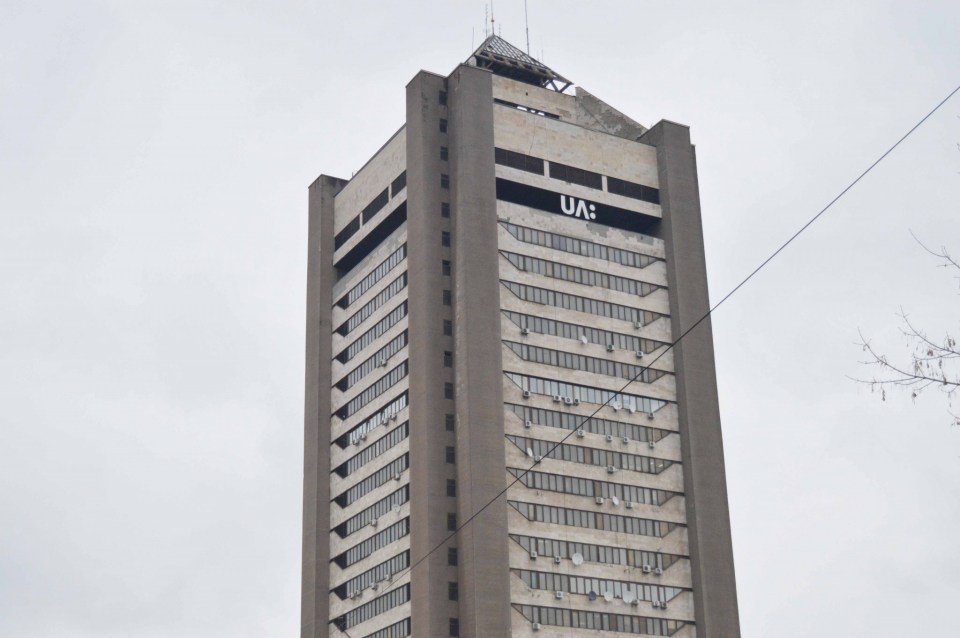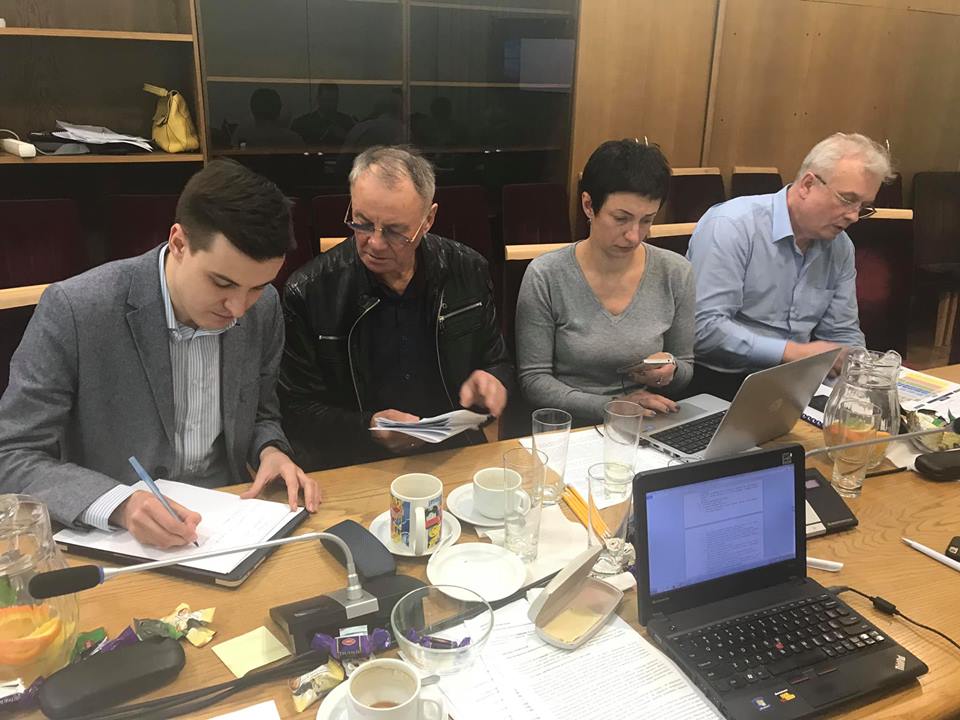The abrupt dismissal of the Ukrainian Public Broadcaster director Zurab Alasania has raised a media fury in Ukraine, with accusations ranging from censorship to state coercion prior to elections. Alasania had many critics, who claim that his unprecedented (for Ukraine) attempt to disengage a major media from those wielding power ended up backfiring, accusing it of becoming out apolitical altogether. However, politics were present on the air of the Broadcaster - it hosted programs doing journalistic investigations against President Poroshenko and his inner circle. Alasania names these programs as one of the reasons for his dismissal.
The abrupt dismissal of the Ukrainian Public Broadcaster director Zurab Alasania has raised a media fury in Ukraine, with accusations ranging from censorship to state coercion prior to elections. Alasania had many critics, who claim that his unprecedented (for Ukraine) attempt to disengage a major media from those wielding power ended up backfiring, accusing it of becoming out apolitical altogether. However, politics were present on the air of the Broadcaster - it hosted programs doing journalistic investigations against President Poroshenko and his inner circle. Alasania names these programs as one of the reasons for his dismissal [/box]
On 31 January 2019, Ukraine was shaken by a huge media scandal. The Supervisory Board of the National Public Broadcasting Company (PBC) broke their contract with the director, Zurab Alasania—in effect, firing him. Representatives of civil society, journalists, and politicians have accused the members of the Supervisory Board of destabilizing the public broadcaster just two months before the presidential election and threatening freedom of speech.
Nine board members voted for Alasania’s dismissal and three against. Since the vote, much criticism has been directed at the Supervisory Board, especially concerning the closed-door format of the meeting. Civic leaders had demanded specific reasons for the decision to terminate, but according to regulations the board had five working days and only released the protocol on 6 February night.
Svitlana Ostapa, one of the three board members who voted against the dismissal, said members had been cautious. They did not want to release an official document because the case might be appealed.
Why is the Public Broadcaster important for Ukraine?

The Ukrainian media landscape is shaped by the oligarchic groups controlling the largest TV channels. As most citizens get their information from TV, control over the narratives broadcast on it is the most direct way for oligarchs to maintain a hold over the dysfunctional, oligarchic-controlled political life in Ukraine. The National Public Broadcasting Company was created after the Euromaidan revolution in a bid to turn things around by stimulating media debate free from the puppet masters behind the scenes. There were several attempts to create the PBC before 2014, but all came together on the crest of Euromaidan’s demand for renewal.
Having started operating full-scale in 2017, the company is the successor of the National Television and Radio Company. Bloated with employees and notorious for outdated broadcasting, throughout its history the National Television and Radio Company often appeared to serve those in power and to ignore widespread corruption. The goal in creating the new Public Broadcaster was to provide an independent vehicle to inform the general public without the external control of private enterprises or oligarchs. Such privately-owned media frequently served the interests of their owners, not the viewers, public citizens. The benefits of a Public Broadcaster included the opportunity for diverse dialogue and variety of opinions, a far cry from the rigid, state-controlled media in neighbouring Russia.
From the outset, the path of the freshly created Public Broadcaster was fraught with obstacles. The new management faced right away the challenge of reorganizing the company, including local outlets across the country. At the same time, they had to start producing interesting and appealing content, and to modernize their production. This task would require adequate funding, but from the beginning the broadcaster was hampered by serious underfunding.
Underfunding
According to legislation, the broadcaster was entitled to 0.2% of the previous year’s state budget expenditures. This is not the amount they received and, not surprisingly, soon accrued debts.
For example, in 2017 the Parliament allocated UAH776mn (US$28.55mn) for the broadcaster, which was half of what was required according to the law. Management voiced their concerns on a regular basis. They were already under pressure to produce results, and underfunding would be a major barrier to success. Throughout the entire year, they struggled for ways to cut corners and still maintain a standard of excellence. By the end of 2018, they had not managed to avoid accumulating debt which amounted to UAH200mn (US$7.35mn). The growing deficit was clear to Alasania, and by mid-year he could foresee that the company would face underfunding the next year again, inevitably compounding the debt.
“If it will be less than UAH1bn (US$36.79mn), the regional branches would have to be closed. There is no other way,” said Alasania in October 2018, referring to the PBC’s network of 48 regional TV and radio stations.
In the end, MPs decided to allocate UAH1.05bn (US$36.97mn) which is more than UAH1bn, but still only 57% of what should have been allocated.
“I admire the exquisite skills of those in power. They cut your hands, but you breathe out with relief because they could have also cut your head, but did not,” Alasania said.
He added that the company would be forced to access their inner reserve to continue developing as a business—in other words, reduce expenditures even further and downsize once again.
In November 2017, Euromaidan Press interviewed Alasania. He commented on the attitude of politicians, who in the past have considered media to serve as an instrument of government.
“The whole country works this way,” he said. “And when you do not do it for three years in a row they start wondering to whom you belong …the president…? …the government? In Ukraine, politicians don’t understand how it can be different, since here you should belong to someone. But when in the fourth year, it becomes clear that you don’t belong to anybody, they label you as ‘incapable of negotiating.’”
In the end, Alasania was so careful about the PBC not serving political interests that he started avoiding politics altogether. His apolitical approach became one of his main points for criticism.
The legacy Alasania inherited

Being the head of the newly created broadcast company was no easy task for Alasania. Especially since the company was not actually new. It had to be transformed from an outdated behemoth to a modern broadcaster, and that brought with it a lot of baggage. Alasania received a relic that was fraught with deficiencies. In his interview with Euromaidan Press, he described the legacy he inherited from a state-controlled company.
At the top of the list, Alasania put the dysfunctional system itself.
“This system consisting of several offices in Kyiv and the regions is a huge monster which works only for itself. From the state budget money it received annually, 2.6% funded program production. The rest, nearly 97%, was spent on supporting the system itself.”
Another problem he faced was that for the last 26 years people in the entire country got used to outdated broadcasting. Alasania’s team had to change the population’s outlook—it was a social challenge as well as one of programming.
“We won’t compete with commercial channels,” says Alasania. “They exist for business...sometimes we have to stop ourselves. For example, can we show bloody fighting, [like] the Mixed Martial Arts? Yes. Is it forbidden by the law? No. Will people watch it? Yes. It is a legal sport? It will bring money. But something stops us as we are a Public Broadcaster. We have this situation with war in the country. Our guys are dying on the frontline almost every day and to show this aggressive program would be wrong.”
Another problem faced by the team was that local outlets themselves were getting money through unofficial ventures—an under-the-table practice that had become widespread and even acceptable.
“The primary way of earning additional funds was by means of hidden advertising. Items in economic news were virtually all sponsored, without revealing the sponsors. Mostly, they paid the National broadcaster in ‘black cash.’ And this helped the management do things for which the state had not allocated money. For example, to broadcast the Olympic Games,” explained Alasania.
As head of the Public Broadcaster, Alasania had to eliminate these outlets, causing even more financial pressure.
Political or apolitical?
When news of Alasania’s dismissal appeared, it immediately raised the question of political influence. Rumours spread that the change in management was made to change the policy of the media resources of the Broadcaster as the country nears the 31 March presidential elections.
But were the reasons for Alasania's dismissal political or was it apolitical? The thinking was two-fold and not unambiguous. On the one hand, with regard to the main channel of UA:Pershiy, state officials and politicians had almost been eliminated from newscasts. On the other hand, UA:Pershiy aired findings of the corruption investigations, both on Schemy (Radio Svoboda) and Nashi Hroshi (Our Money) with Denys Bihus. The two programs are known for investigating possible corruption by President Poroshenko and others in his government. The broadcasters dug up connections to Russia by Ukraine’s Deputy Chief of Security Services (SBU) Serhiy Semochko. They looked at some of the activities by presidential candidate Volodymyr Zelenskyy, and scrutinized other officials as well.
Despite the delay in publishing the report of dismissing Alasania, some facts came to the fore. During the actual board meeting, Alasania used his mobile to photograph the report page that listed his alleged political bias. Apparently, the board had determined that during 2018 Alasania implemented the “wrong principle of detaching from the authorities,” which contradicted the mission of the National Public Broadcasting to “provide society with reliable balanced information about Ukraine and the world.” The document also accused Alasania of failing to organize UA:Pershyi as a “socio-political channel” which allegedly led to missing several important events in the country. They listed the procession in support for autocephaly for the Ukrainian Orthodox Church in Kyiv in July; the UN General Assembly meeting on Ukraine, in New York in September; and the Economic Forum in Kharkov, also in September; at each of which President Poroshenko delivered speeches.
The head of the Supervisory Board, Tetiana Lebedeva, released the photo of the full version of the report. In it she clarified that missing coverage of the Poroshenko events was not a reason for Alasania’s dismissal. According to her, this item was suggested by a board member and only tangentially included. The full report includes five points. Among them are “contradictory financial policy” and “inability to streamline the company's financial statements.”
The voice of reason

Svitlana Ostapa, deputy head of the Supervisory Board, and deputy editor-in-chief of the media watchdog Detektor Media, provided a balanced account
of Alasania’s dismissal. She noted that Alasania won the vote to head the Broadcaster in 2017 with a majority of only one vote. His opponents started disliking him for not representing the interests of their own political factions, those who had originally nominated them to the board; in other words, factions to whom they were beholden
“Some members of the board from the parliamentary factions sincerely thought that they should represent the interests of the political force which nominated them and made claims towards Zurab, because the representatives of their factions or groups were not shown by the broadcaster,” wrote Ostapa.
Moreover, she said that some of his supporters in 2017 grew disappointed with him over the next two years.
Alasania’s main opponent, and the board member who initiated the dismissal vote, was Viacheslav Kozak, who was nominated to the board by the Radical Party of Oleh Liashko.
Ostapa says that for her the voting came out of the blue. In retrospect, she can see the signs that other members were planning it in advance. Although Ostapa did not support the vote to dismiss Alasania, she did have some criticism for him.
“First of all, Zurab destroyed state broadcasting and broke all the connections with the central and local power. Nobody else from the candidates [to PBC director] who applied for the competition in 2017 could do this. On the one hand I am grateful to him for it, on the other hand, this led to the total apoliticism of the Public Broadcaster.”
Ostapa explained that because Alasania refused to promote the authorities, they disappeared from the air of the public TV altogether.
“You should control those in power, but the state authorities are also an information source which you should learn to distinguish from [their self-] promotion.”
Despite her criticisms, Ostapa still believes that Alasania’s dismissal went one step too far. “We should have been in one boat. We should have built the Public Broadcaster. I consider everything which has happened as undemocratic.”
Taras Shevchenko is Chief Executive Officer of the Center for Democracy and Rule of Law (CEDEM), an NGO that is actively involved in media reform. Shevchenko referred to their 2017 report in which CEDEM mentioned their concern in setting out multiple options for a pre-term dismissal. They stated that including excessive reasons for such a dismissal constitutes a threat to the independence of the broadcaster and its governing body.
On the day of Alasania’s dismissal, the board also voted to appoint Mykola Chernotytskyi as acting head of the Public Broadcaster until Alasania’s departure on 14 February. Chernotytskyi, however, was not present at the 31 January meeting and only learned of the decision after the fact. He made it very clear that he stands with Alasania’s team.
In further events, on 4 February, producers at 20 regional outlets of the Public Broadcaster signed an open letter to the Supervisory Board requesting that the dismissal be rescinded. Reacting to the news, Alasania expressed his intention to appeal the decision to the courts.
The key points of the arguments for it were:
- That Alasania created an executive structure headed by the executive director in parallel to the existing Board of the Broadcaster, spending UAH8mn ($296,056) on it in 15 months;
- The unbalanced financial policy of the company;
- The disordered financial statements of the company;
- And above-mentioned reasons of not covering social-political events and apoliticism.
Earlier, Svitlana Ostapa described the possible scenario after the protocol was published – the Supervisory Board could have another meeting to consider all the questions from 31 January. At the same meeting, the matter of cancelling the dismissal could be raised. The expert also supported the need for another meeting of the Supervisory Board to consider additional crucial matters, since such important issues as presidential debates and current funding of the company are now in question. Could the decision to dismiss Alasania be rolled back? The next meeting will show.

